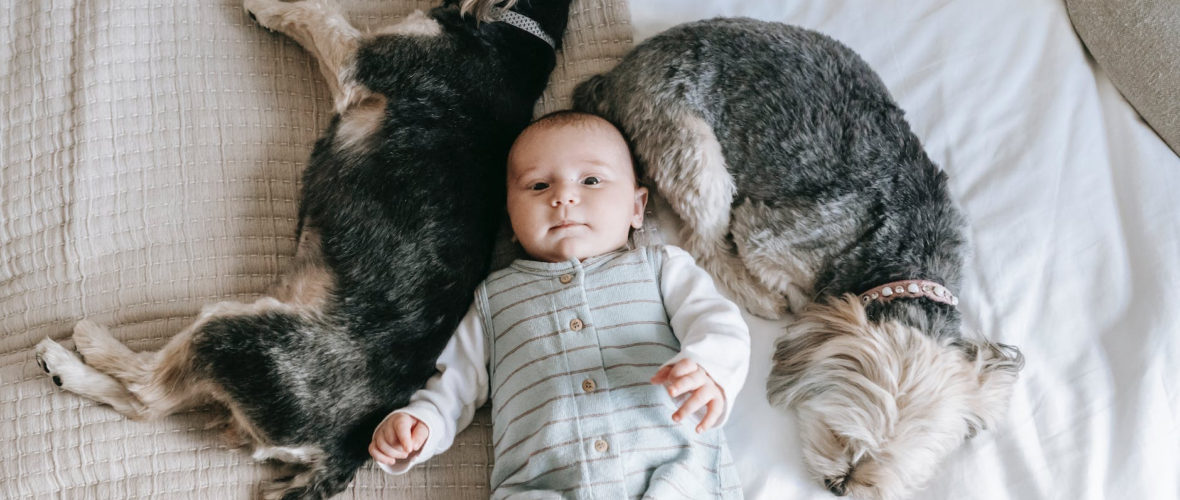You often hear couples say they first got a plant and then a dog as “test runs” before having their first child. Practice makes perfect, so you should make sure you can keep a plant and a dog alive before you try to keep a tiny human alive, right? Maybe it’s time to rethink the idea of pets as pre-baby practice. Although getting a dog, especially a puppy, may prepare you for interrupted sleep, non-verbal communication, and caring for a living creature, dog ownership is not a stepping stone to parenthood. It may be better to wait until after your kids are born before introducing a family dog into the mix.
A SHELTER VETERINARIAN’S PERSPECTIVE
Having worked at an animal shelter for over three years, I regularly saw dogs (and sometimes cats) surrendered to the shelter for not getting along with a new baby. Occasionally, aggression directed towards children would end in euthanasia. On the flip side, I cannot recall a single time that a new puppy got returned for aggression towards the adopter’s children. You set your dog up for failure when their place as the center of your universe gets usurped by a child.
WHAT’S THE WORST THAT COULD HAPPEN?
According to the Centers for Disease Control and Prevention, most reported dog bites occur in children bitten by a familiar dog during everyday activities. About 80% of pediatric dog bites occur in children 9 years of age or younger. Children under 6 years of age are much more likely to be bitten in the face or neck, with these severe injuries potentially requiring surgical repair and resulting in permanent scarring. Dog bites are very traumatic to young children, causing fear of dogs, anxiety, and nightmares. It is important to understand that dog bites can be fatal, particularly in very young children.
If your dog did not regularly interact with children during their socialization window (around 3-16 weeks of age), then your dog is at a higher risk of reacting with anxiety and fear when you bring a new child into the home, creating substantial risk for a bite. Additionally, your newborn may be too young to understand dog behavior, including warning signals. An anxious dog and a newborn human should not be interacting with one another.
I ALREADY HAVE A DOG…SHOULD I NOT HAVE KIDS THEN?
You should understand how your dog reacts to children prior to deciding to have kids. If you adopt from a shelter, the shelter may have information on how the pet has historically behaved around children. If you do not know how your dog is with kids, it may be beneficial to introduce them to children in a controlled and supervised environment. You should have a plan in place for next steps if your newborn and dog do not get along. If your dog is not safe for your new child, consider finding them a home without children or contacting your local animal shelter.
Even if you feel your dog will be safe around kids, the following advice should be followed:
- Do not leave young children unattended with a dog. Interactions should always be supervised.
- Teach your children about dog body language and warning signals.
- Ensure your kids know to respect a dog’s space, to remain calm when meeting a dog, and to allow the dog to approach them.
- Instruct your children not to reach towards or touch a dog who is eating, sleeping, or playing with a toy.
- Consider modifying your home to keep dogs and newborns separate, particularly when not supervised. An example could include the use of baby gates to confine your dog to particular areas of the home.
- Speak with a physician about dog bite prevention.
THIS SOUNDS SCARY. MAYBE I DON’T WANT WANT A DOG.
Having a family dog can be very rewarding. Dog ownership can teach your children responsibility and empathy. Studies show that children who grow up with pets are more likely to show emotional stability and have fewer conflicts with their peers. Although you may need to consider additional safeguards to prevent bites, dogs have also been shown to be tremendously beneficial for neurodivergent children. Dog ownership can encourage your entire family to live a more active lifestyle, and dog owners typically experience a reduction in depression and anxiety. You’ve likely heard that having a dog can actually decrease your blood pressure!
Growing up with a dog could be tremendously beneficial to your family and children, but it may be best if your child joins the family first! If you’re considering getting a dog after having a kid, do keep in mind that it can be exhausting to have both a newborn human and puppy simultaneously! However you decide to build your family, ensure you have a strong relationship with both a veterinarian and a pediatrician to maximize your likelihood of a successful, happy human-animal bond!
Sources:
Christian H, Mitrou F, Cunneen R, Zubrick SR. Pets Are Associated with Fewer Peer Problems and Emotional Symptoms, and Better Prosocial Behavior: Findings from the Longitudinal Study of Australian Children. J Pediatr. 2020;220:200-206.e2. doi:10.1016/j.jpeds.2020.01.012
Friedman E, Krause-Parello CA. Companion animals and human health: benefits, challenges, and the road ahead for human-animal interaction. Rev Sci Tech. 2018;37(1):71-82. doi:10.20506/rst.37.1.2741
Jakeman M, Oxley JA, Owczarczak-Garstecka SC, Westgarth C. Pet dog bites in children: management and prevention. BMJ Paediatr Open. 2020;4(1):e000726. Published 2020 Aug 11. doi:10.1136/bmjpo-2020-000726
Patterson KN, Horvath KZ, Minneci PC, et al. Pediatric dog bite injuries in the USA: a systematic review. World Journal of Pediatric Surgery 2022;5:e000281. doi: 10.1136/wjps-2021-000281
[/et_pb_text][/et_pb_column] [/et_pb_row] [/et_pb_section]
